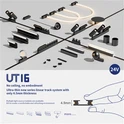Structure and properties of PC materials
General performance: PC is a transparent, slightly yellow or white hard and tough resin. When burned, it emits a fruity smell, self-extinguishes when removed from the fire, has a yellow flame and melts bubbles.
Mechanical properties: The mechanical properties of PC are very excellent and have the advantages of rigidity and toughness. Its impact performance is the best among thermoplastics, up to three times higher than PA and POM, and close to the level of PF and UP fiberglass. PC has good tensile strength and bending strength, and is less affected by temperature. The creep resistance of PC is better than that of PA and POM, and its dimensional stability is good.
Thermal properties: PC has good resistance to high and low temperatures. It can be used in the temperature range of -130~130℃. The thermal deformation temperature can reach 130-140℃. It is subject to little load and has relatively small thermal conductivity and linear expansion coefficient. It has good flame retardancy and is a self-extinguishing material.
Electrical properties: PC is a weakly polar polymer and its insulation properties are average. But the valuable thing is that its electrical properties change little over a wide temperature range. For example, the dielectric constant and dielectric loss tangent are almost unchanged in the range of 23-125°C. However, it should be noted that as the crystallinity of PC products increases, their volume resistivity increases.
Environmental performance: PC is resistant to organic acids, dilute inorganic acids, salts, oils, aliphatic hydrocarbons and alcohols, but is not resistant to chlorine hydrocarbons, dilute alkali, Australian water, concentrated acids, amines, ketones and lipids, etc., and is soluble in diluents. In solvents such as methyl chloride, dichloroethane and cresol. PC is not resistant to hot water above 60°C, and long-term exposure will cause stress cracking and loss of toughness. PC's UV resistance is not good and UV absorbers need to be added, but PC's resistance to air and ozone is better.
Optical properties: PC is one of the mechanical plastic varieties with excellent strength. Its light transmittance can reach as much as 93% and its refractive index is 1.587, which is suitable for lens materials. The disadvantages of PC as a high-end optical material are: first, low hardness and poor wear resistance; second, high birefringence, making it difficult to use in high-precision products such as optical instruments.







